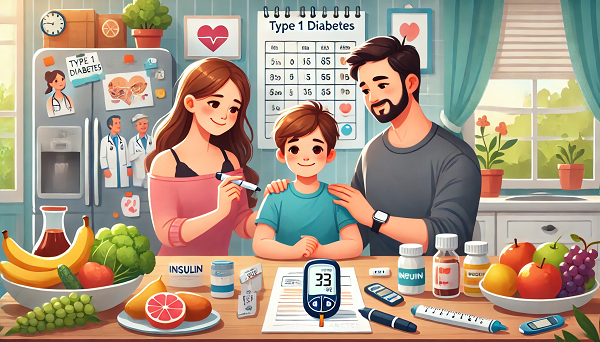Raising a child is a challenging yet rewarding experience for any parent. When a child is diagnosed with Type 1 Diabetes (T1D), the responsibilities and concerns multiply. Type 1 Diabetes is an autoimmune condition where the pancreas produces little to no insulin, a hormone essential for converting glucose into energy. Managing this chronic illness involves constant vigilance, meticulous planning, and emotional resilience. This blog will explore the multifaceted challenges and concerns that parents face when raising children with T1D, providing insights and resources to navigate this complex journey.
Understanding Type 1 Diabetes
What is Type 1 Diabetes?
Type 1 Diabetes (T1D) is an autoimmune disease where the body’s immune system attacks the insulin-producing beta cells in the pancreas. Without insulin, glucose builds up in the bloodstream, leading to high blood sugar levels. Unlike Type 2 Diabetes, T1D is not linked to lifestyle factors and cannot be prevented.
Symptoms and Diagnosis
The symptoms of T1D often appear suddenly and can include extreme thirst, frequent urination, weight loss, fatigue, and blurred vision. A diagnosis is usually confirmed through blood tests that measure blood sugar levels and the presence of autoantibodies.
The Emotional Toll
Initial Shock and Adjustment
The diagnosis of T1D can be overwhelming for parents. The initial shock often gives way to a period of adjustment where parents must learn about the disease, its management, and how it will impact their child’s life. This phase can be emotionally draining as parents grapple with feelings of fear, guilt, and uncertainty about the future.
Ongoing Stress and Anxiety
The need for constant monitoring and the potential for severe complications, such as diabetic ketoacidosis or hypoglycemia, contribute to ongoing stress and anxiety. Parents often worry about their child’s health, the effectiveness of their management strategies, and the impact of the disease on their child’s overall well-being.
The Practical Challenges
Daily Management
Managing T1D requires a daily routine that includes monitoring blood sugar levels, administering insulin, and balancing food intake with physical activity. Parents must become proficient in using blood glucose meters, insulin pumps, or syringes and understanding carbohydrate counting. This daily regimen can be time-consuming and requires meticulous attention to detail.
Dealing with Hypoglycemia and Hyperglycemia
Hypoglycemia (low blood sugar) and hyperglycemia (high blood sugar) are constant concerns. Hypoglycemia can occur due to excessive insulin, missed meals, or increased physical activity, leading to symptoms such as shakiness, sweating, confusion, and even seizures. Hyperglycemia, on the other hand, can result from insufficient insulin, leading to symptoms like excessive thirst, frequent urination, and fatigue. Both conditions require immediate attention to prevent severe complications.
Social and Educational Concerns
School and Social Activities
Ensuring that children with T1D have a normal school experience and participate in social activities requires careful planning and coordination. Parents need to work closely with school staff to develop an individualized care plan that includes blood sugar monitoring, insulin administration, and emergency procedures. Social activities, such as birthday parties and sleepovers, also require additional planning to ensure the child’s dietary needs and insulin requirements are met.
Bullying and Stigmatization
Children with T1D may face bullying or stigmatization due to their condition. They may feel different from their peers and be self-conscious about their medical devices or the need to check blood sugar levels and take insulin injections. Parents must educate their children about T1D and encourage open communication to help them build resilience and self-confidence.
Financial Burden
Medical Expenses
The financial burden of managing T1D can be substantial. Costs include insulin, blood glucose meters, test strips, insulin pumps, continuous glucose monitors (CGMs), and regular medical appointments. Even with insurance, out-of-pocket expenses can be significant, adding financial stress to the emotional and practical challenges.
Insurance and Coverage Issues
Navigating health insurance and ensuring adequate coverage for diabetes management supplies and treatments can be complex and frustrating. Parents often have to advocate for their child’s needs and navigate bureaucratic hurdles to obtain the necessary resources.
Long-Term Concerns of Childhood Type 1 Diabetes
Complications and Health Risks
Parents are often concerned about the long-term health risks associated with T1D, such as heart disease, kidney damage, nerve damage, and vision problems. Regular medical check-ups and a well-managed care plan are essential to mitigate these risks, but the potential for complications remains a constant worry.
Transition to Independence
As children with T1D grow older, they must learn to take more responsibility for their own care. This transition can be challenging as parents balance the need to foster independence with the desire to ensure their child’s safety and well-being. Preparing children to manage their condition independently involves educating them about diabetes, encouraging self-monitoring, and gradually transferring responsibilities.
Type 1 Diabetes Resources and Support
Educational Resources
Numerous resources are available to help parents and children manage T1D. Organizations such as the Juvenile Diabetes Research Foundation (JDRF) and the American Diabetes Association (ADA) provide educational materials, support groups, and advocacy services.
Support Networks
Building a support network is crucial for parents of children with T1D. Support groups, both online and in-person, offer a platform to share experiences, advice, and emotional support. Connecting with other families facing similar challenges can be incredibly reassuring and empowering.
Raising a child with Type 1 Diabetes presents unique challenges and concerns that require emotional strength, practical skills, and a supportive community. By understanding the complexities of the disease, staying informed about management strategies, and seeking support, parents can help their children lead healthy, fulfilling lives. While the journey is demanding, the resilience and determination of both parents and children can lead to remarkable growth and success.
References and Links
- Juvenile Diabetes Research Foundation (JDRF) – JDRF
- American Diabetes Association (ADA) – American Diabetes Association
- National Institute of Diabetes and Digestive and Kidney Diseases (NIDDK) – NIDDK
- Diabetes UK – Diabetes UK
Additional Reading
#Type1Diabetes #ChildhoodDiabetes #DiabetesManagement #InsulinTherapy #BloodSugarMonitoring #DiabetesAwareness #DiabetesSupport #ParentingWithDiabetes #DiabetesEducation #HealthAndWellness







